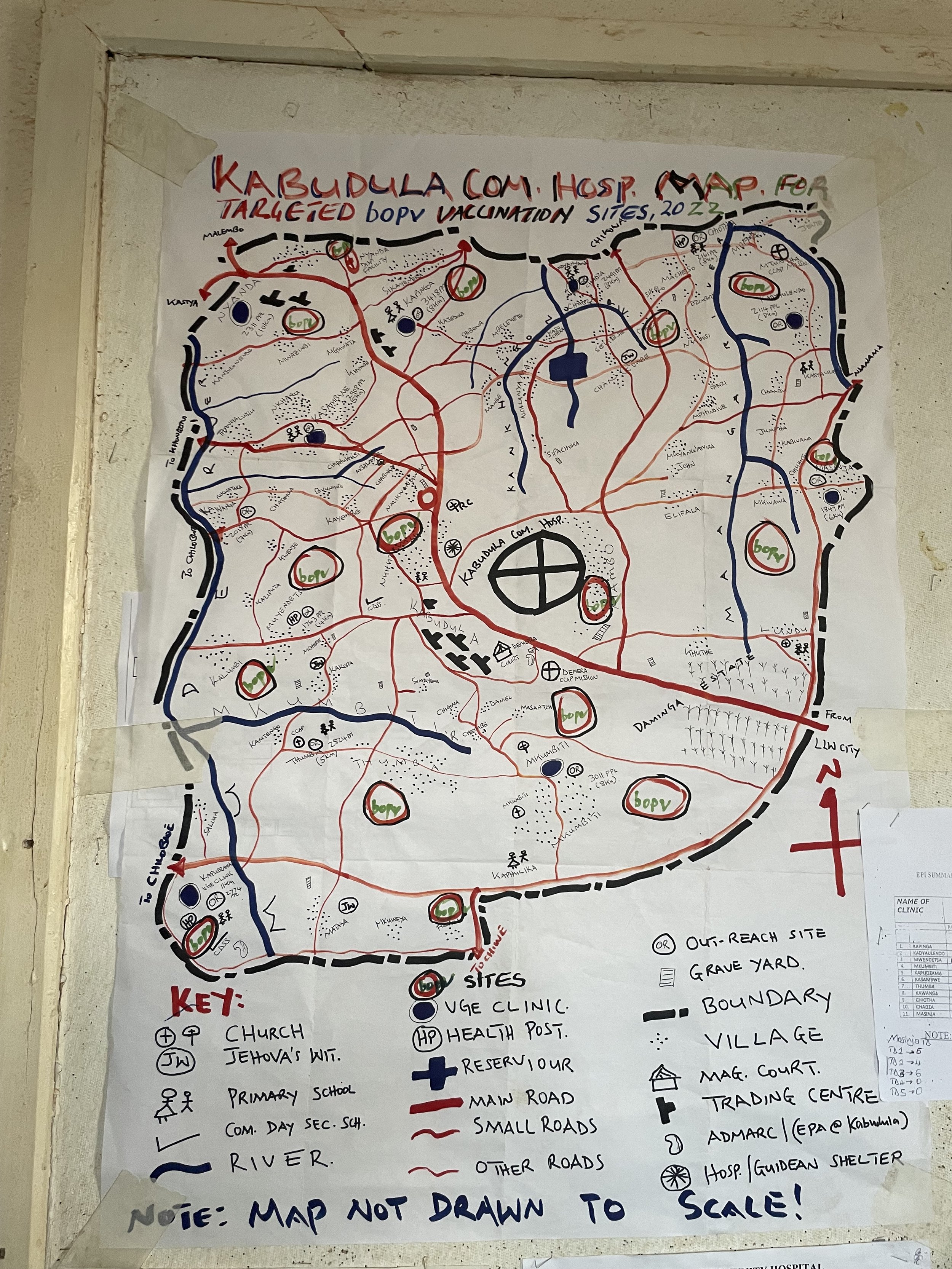When AHA first began doing surgery in the village of Kabudula (Kab) in 2014, international visitors completed most of the procedures, and only very minor procedures could be done when we weren’t there. The road from Lilongwe to Kab was dirt, and only one clinician had experience in minor surgeries and could independently complete minor procedures. Yet there were hundreds of patients with untreated surgical conditions around Kab trading center alone, and services had not yet been extended to the surrounding rural health centers.
Hand drawn map of Kabudula’s catchment area, photographed April 2022.
During regular visits to Kab, we train clinicians and doubled and then tripled the number of patients served in a week. By 2018, the international and local teams were able to operate together on over 100 patients in a week.
The chance to visit Malawi, partner with local healthcare providers, and provide care directly to those in need appealed to more than just surgeons. A dental team came to Kab and an emergency medicine specialist provided CPR and Basic Life Saving Training to health workers and community members from Kab and the rural centers that feed into it.
When the road was paved in 2018, Kab began to grow. The new tar road is in much better condition than the older highway heading north out of Lilongwe, so now motorists prefer to use the Kab route to go north to rather than the older M1. This has made Kab a stopping point on longer journeys as well. With the establishment of the first filling station in the area last year, Kab is now more of a small town than a village.
The Kab catchment area includes eight rural health centers within a 30km radius, which means Kab receives referrals from all of these rural health centers and therefore serves a large rural population. All of the health centers are on dirt roads branching off of the new tar road that passes through Kab. Surgical patients also come from health centers outside of Kab’s catchment area because of a lack of surgical services at their own facilities.
In 2019, AHA completed a needs assessment of Kab and the referral system, including the eight rural health centers. In preparation for the 2019 surgical week, we reached out to all of the rural health centers to introduce the surgical, dental, and training programs. We conducted surgical patient screening days at each health center and organized roundtrip transportation for patients from the rural health centers to ad from Kab.
Knowing just how many dental patients and rural healthcare workers there were to serve during that trip, the dental team and CPR/BLS training team conducted dental and training activities at three of the rural health centers in addition to Kab. The dental team treated 235 patients at the rural health centers and an additional 19 patients at Kab itself. That’s 254 dental patients. That’s amazing.
The trainers trained 74 people at the rural health centers and at two sessions at Kab. On average, 77% of participants showed increased knowledge for both trauma and sepsis based on pre- and post-tests. Now imagine how many patients are receiving improved care from those 74 trainees.
2019 visiting team who partnered with Kab staff to perform 97 total surgeries, treated 254 dental patients, and trained 74 healthcare workers.
During the second half of 2019, we increased the sustainability of the surgical program by introducing local surgical camps to ensure that surgical services could continue throughout the year, even after the departure of the international team. The first surgeon to supervise a camp at Kab was Dr. Vanessa Msosa from Kamuzu Central Hospital (KCH) in Lilongwe, a long-time friend and advisor of AHA.
During the pandemic, we have hosted bimonthly surgical camps at Kab staffed completely by local clinicians, also from KCH.
In addition to bringing international and local healthcare providers to Kab, we have also stayed busy completing infrastructure improvements and screening and following-up with surgical patients in between camps.
Now, the surgical program at Kab is well-established, thanks in large part to the ongoing commitment of KCH’s Clinician Nelson Msiskah, with whom we have worked on the majority of local. Nelson has helped us expand the types of procedures that can be done at Kab, and he is always willing to go the extra mile for the program, the patients, and Kab’s staff.
We are beginning to see fewer patients with less severe conditions coming from Kab catchment area, which means that the services offered are starting to catch up with the backlog. However, we are also seeing increased numbers of patients with more severe conditions coming from farther away, as observed during the recent camp with international visitors earlier this month (April 2022). This is not only because of awareness of AHA’s surgical program is spreading, but also because these patients cannot access the necessary services within at their hospital. This illuminates a clear need for similar initiatives to improve the surgical offerings at other health centers similar to Kab.


